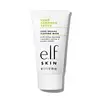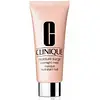What's inside
What's inside
 Key Ingredients
Key Ingredients

 Benefits
Benefits

 Concerns
Concerns

 Ingredients Side-by-side
Ingredients Side-by-side

Water
Skin ConditioningGlycerin
HumectantCetyl Ethylhexanoate
EmollientCaprylic/Capric Triglyceride
MaskingButyrospermum Parkii Butter
Skin ConditioningDimethicone
EmollientCetearyl Alcohol
EmollientGlyceryl Stearate
EmollientPEG-100 Stearate
PEG-8
HumectantGlycereth-26
HumectantTrehalose
HumectantCannabis Sativa Seed Oil
EmollientSodium Hyaluronate
HumectantHelianthus Annuus Seed Oil
EmollientTocopherol
AntioxidantTocopheryl Acetate
AntioxidantAscorbyl Palmitate
AntioxidantJojoba Esters
EmollientMannitol
HumectantCellulose
AbsorbentHydroxypropyl Methylcellulose
Emulsion StabilisingSorbitan Stearate
EmulsifyingAcrylates/C10-30 Alkyl Acrylate Crosspolymer
Emulsion StabilisingCaprylyl Glycol
EmollientEthylhexylglycerin
Skin ConditioningPhenoxyethanol
PreservativeDisodium EDTA
Tromethamine
BufferingCI 77289
Cosmetic ColorantWater, Glycerin, Cetyl Ethylhexanoate, Caprylic/Capric Triglyceride, Butyrospermum Parkii Butter, Dimethicone, Cetearyl Alcohol, Glyceryl Stearate, PEG-100 Stearate, PEG-8, Glycereth-26, Trehalose, Cannabis Sativa Seed Oil, Sodium Hyaluronate, Helianthus Annuus Seed Oil, Tocopherol, Tocopheryl Acetate, Ascorbyl Palmitate, Jojoba Esters, Mannitol, Cellulose, Hydroxypropyl Methylcellulose, Sorbitan Stearate, Acrylates/C10-30 Alkyl Acrylate Crosspolymer, Caprylyl Glycol, Ethylhexylglycerin, Phenoxyethanol, Disodium EDTA, Tromethamine, CI 77289
Water
Skin ConditioningGlycerin
HumectantCetyl Alcohol
EmollientDimethicone
EmollientGlyceryl Polymethacrylate
Butyrospermum Parkii Butter
Skin ConditioningCetyl Ethylhexanoate
EmollientPEG-8
HumectantGlycereth-26
HumectantSucrose
HumectantSorbitan Stearate
EmulsifyingPEG-100 Stearate
Trehalose
HumectantMangifera Indica Seed Butter
Skin ConditioningHypnea Musciformis Extract
Skin ProtectingGelidiella Acerosa Extract
Skin ProtectingOlea Europaea Fruit Extract
BleachingTriticum Vulgare Bran Extract
Skin ConditioningCladosiphon Okamuranus Extract
Skin ConditioningAstrocaryum Murumuru Seed Butter
EmollientCetearyl Alcohol
EmollientAloe Barbadensis Leaf Water
MaskingPEG-75
HumectantCaffeine
Skin ConditioningPantethine
EmollientSorbitol
HumectantButylene Glycol
HumectantOryzanol
Skin ConditioningBisabolol
MaskingPanthenol
Skin ConditioningPhytosterols
Skin ConditioningTocopheryl Acetate
AntioxidantCaprylyl Glycol
EmollientSodium Hyaluronate
HumectantHexylene Glycol
EmulsifyingCarbomer
Emulsion StabilisingPotassium Hydroxide
BufferingDextrin
AbsorbentDisodium EDTA
Phenoxyethanol
PreservativeCI 14700
Cosmetic ColorantCI 19140
Cosmetic ColorantWater, Glycerin, Cetyl Alcohol, Dimethicone, Glyceryl Polymethacrylate, Butyrospermum Parkii Butter, Cetyl Ethylhexanoate, PEG-8, Glycereth-26, Sucrose, Sorbitan Stearate, PEG-100 Stearate, Trehalose, Mangifera Indica Seed Butter, Hypnea Musciformis Extract, Gelidiella Acerosa Extract, Olea Europaea Fruit Extract, Triticum Vulgare Bran Extract, Cladosiphon Okamuranus Extract, Astrocaryum Murumuru Seed Butter, Cetearyl Alcohol, Aloe Barbadensis Leaf Water, PEG-75, Caffeine, Pantethine, Sorbitol, Butylene Glycol, Oryzanol, Bisabolol, Panthenol, Phytosterols, Tocopheryl Acetate, Caprylyl Glycol, Sodium Hyaluronate, Hexylene Glycol, Carbomer, Potassium Hydroxide, Dextrin, Disodium EDTA, Phenoxyethanol, CI 14700, CI 19140
 Reviews
Reviews

Ingredients Explained
These ingredients are found in both products.
Ingredients higher up in an ingredient list are typically present in a larger amount.
This ingredient is also known as shea butter. It is an effective skin hydrator and emollient.
Emollients help soothe and soften your skin. It does this by creating a protective film on your skin. This barrier helps trap moisture and keeps your skin hydrated. Emollients may be effective at treating dry or itchy skin.
Shea butter is rich in antioxidants. Antioxidants help fight free-radicals, or molecules that may harm the body. It is also full of fatty acids including stearic acid and linoleic acid. These acids help replenish the skin and keep skin moisturized.
While Shea Butter has an SPF rating of about 3-4, it is not a sunscreen replacement.
Shea butter may not be fungal acne safe. We recommend speaking with a professional if you have any concerns.
Learn more about Butyrospermum Parkii ButterCaprylyl Glycol is a humectant and emollient, meaning it attracts and preserves moisture.
It is a common ingredient in many products, especially those designed to hydrate skin. The primary benefits are retaining moisture, skin softening, and promoting a healthy skin barrier.
Though Caprylyl Glycol is an alcohol derived from fatty acids, it is not the kind that can dry out skin.
This ingredient is also used as a preservative to extend the life of products. It has slight antimicrobial properties.
Learn more about Caprylyl GlycolCetearyl alcohol is a mixture of two fatty alcohols: cetyl alcohol and stearyl alcohol. It is mainly used as an emulsifier. Emulsifiers help prevent the separation of oils and products. Due to its composition, it can also be used to thicken a product or help create foam.
Cetearyl alcohol is an emollient. Emollients help soothe and hydrate the skin by trapping moisture.
Studies show Cetearyl alcohol is non-toxic and non-irritating. The FDA allows products labeled "alcohol-free" to have fatty alcohols.
This ingredient is usually derived from plant oils such as palm, vegetable, or coconut oils. There is debate on whether this ingredient will cause acne.
Due to the fatty acid base, this ingredient may not be Malassezia folliculitis safe.
Learn more about Cetearyl AlcoholCetyl Ethylhexanoate is an emollient ester. It comes from cetearyl alcohol and 2-ethylhexanoic acid.
Cetyl Ethylhexanoate is an emollient that adds a velvety feel to skin without being greasy or oily. Emollients help trap moisture into your skin, keeping your skin soft and hydrated.
Dimethicone is a type of synthetic silicone created from natural materials such as quartz.
What it does:
Dimethicone comes in different viscosities:
Depending on the viscosity, dimethicone has different properties.
Ingredients lists don't always show which type is used, so we recommend reaching out to the brand if you have questions about the viscosity.
This ingredient is unlikely to cause irritation because it does not get absorbed into skin. However, people with silicone allergies should be careful about using this ingredient.
Note: Dimethicone may contribute to pilling. This is because it is not oil or water soluble, so pilling may occur when layered with products. When mixed with heavy oils in a formula, the outcome is also quite greasy.
Learn more about DimethiconeDisodium EDTA plays a role in making products more stable by aiding other preservatives.
It is a chelating agent, meaning it neutralizes metal ions that may be found in a product.
Disodium EDTA is a salt of edetic acid and is found to be safe in cosmetic ingredients.
Learn more about Disodium EDTAGlycereth-26 is a synthetic ingredient and polyethylene glycol ether of Glycerin. Glycerin is already naturally found in your skin and helps keep your skin moisturized.
It is a humectant and helps add texture to products. It can make your product thicker.
As a humectant, it helps draw moisture from the air to your skin. This helps your skin stay hydrated.
Learn more about Glycereth-26Glycerin is already naturally found in your skin. It helps moisturize and protect your skin.
A study from 2016 found glycerin to be more effective as a humectant than AHAs and hyaluronic acid.
As a humectant, it helps the skin stay hydrated by pulling moisture to your skin. The low molecular weight of glycerin allows it to pull moisture into the deeper layers of your skin.
Hydrated skin improves your skin barrier; Your skin barrier helps protect against irritants and bacteria.
Glycerin has also been found to have antimicrobial and antiviral properties. Due to these properties, glycerin is often used in wound and burn treatments.
In cosmetics, glycerin is usually derived from plants such as soybean or palm. However, it can also be sourced from animals, such as tallow or animal fat.
This ingredient is organic, colorless, odorless, and non-toxic.
Glycerin is the name for this ingredient in American English. British English uses Glycerol/Glycerine.
Learn more about GlycerinPeg-100 Stearate is an emollient and emulsifier. As an emollient, it helps keep skin soft by trapping moisture in. On the other hand, emulsifiers help prevent oil and water from separating in a product.
PEGS are a hydrophilic polyether compound . There are 100 ethylene oxide monomers in Peg-100 Stearate. Peg-100 Stearate is polyethylene glycol ester of stearic acid.
PEG-8 is a synthetic polymer used as a humectant and solvent.
This ingredient is able to help dissolve active ingredients, including water. This gives it humectant properties.
It is soluble in water. The number '8' stands for the molecular weight of the ingredient.
Learn more about PEG-8Phenoxyethanol is a preservative that has germicide, antimicrobial, and aromatic properties. Studies show that phenoxyethanol can prevent microbial growth. By itself, it has a scent that is similar to that of a rose.
It's often used in formulations along with Caprylyl Glycol to preserve the shelf life of products.
Sodium Hyaluronate is hyaluronic acid's salt form. It is commonly derived from the sodium salt of hyaluronic acid.
Like hyaluronic acid, it is great at holding water and acts as a humectant. This makes it a great skin hydrating ingredient.
Sodium Hyaluronate is naturally occurring in our bodies and is mostly found in eye fluid and joints.
These are some other common types of Hyaluronic Acid:
Learn more about Sodium HyaluronateSorbitan Stearate comes from sorbitol and stearic acid. Sorbitol is a type of sugar and stearic acid is a fatty acid.
It is used as an emulsifier and helps ingredients stay together by creating water-in-oil emulsions.
This ingredient may not be Malassezia folliculitis, or fungal-acne safe.
Tocopheryl Acetate is AKA Vitamin E. It is an antioxidant and protects your skin from free radicals. Free radicals damage the skin by breaking down collagen.
One study found using Tocopheryl Acetate with Vitamin C decreased the number of sunburned cells.
Tocopheryl Acetate is commonly found in both skincare and dietary supplements.
Learn more about Tocopheryl AcetateTrehalose is a disaccharide made of two glucose molecules (glucose is sugar!). Trehalose is used to help moisturize skin. It also has antioxidant properties.
As a humectant, trehalose helps draw moisture from the air to your skin. This helps keep your skin hydrated.
Due to its antioxidant properties, trehalose may help with signs of aging. Antioxidants help fight free-radical molecules, unstable molecules that may damage your skin.
In medicine, trehalose and hyaluronic acid are used to help treat dry eyes.
Some animals, plants, and bacteria create trehalose as a source of energy to survive freeze or lack of water.
Learn more about TrehaloseWater. It's the most common cosmetic ingredient of all. You'll usually see it at the top of ingredient lists, meaning that it makes up the largest part of the product.
So why is it so popular? Water most often acts as a solvent - this means that it helps dissolve other ingredients into the formulation.
You'll also recognize water as that liquid we all need to stay alive. If you see this, drink a glass of water. Stay hydrated!
Learn more about Water